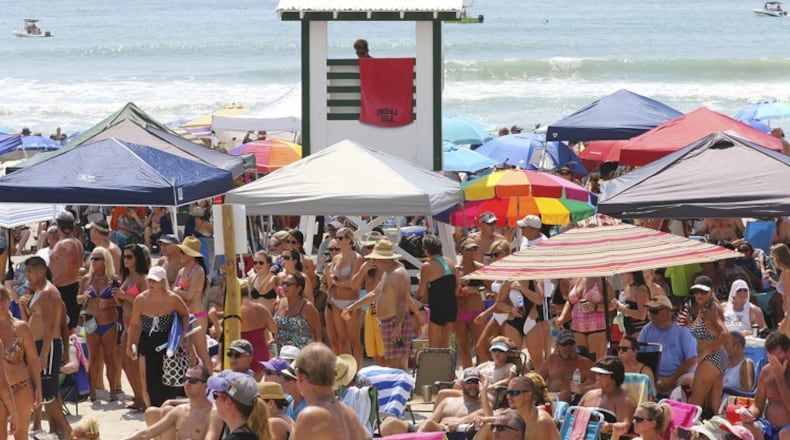JEKYLL ISLAND — Georgia Rep. Ron Stephens vividly recalls his telephone conversation with Gov. Brian Kemp in late spring 2020.
“Can you meet me in Jekyll tomorrow?” Kemp asked Stephens, the chairman of the Georgia House Economic Development and Tourism Committee. “We’re going to reopen.”
Now three years later, Kemp’s polarizing decision to make Georgia the first state to rollback COVID-19 business lockdowns is being lauded by those in Georgia’s tourism industry as the “jump start” for the state’s booming post-pandemic tourism economy. At this week’s Governor’s Tourism Conference, officials announced a record-breaking year for the sector in 2022, one that eclipsed pre-pandemic returns.
Last year’s business boom was the continuation of a three-year trend. Georgia moved from seventh place in terms of overnight visitor market share to fifth place in 2020 and has held that position since, trailing only tourism titans Florida, New York, California and Texas. Georgia tourism revenues from 2022 totaled $2 billion more than in 2019, the previous banner year.
Jobs in leisure and hospitality, the sector that typically includes most jobs in tourism and convention work, have exploded in the past several years, according to the Bureau of Labor Statistics. The state has added 188,400 leisure and hospitality jobs since May 2020 — growth of more than 54%.
Credit: Courtesy photo
Credit: Courtesy photo
Beyond those working in the tourism industry, Kemp’s early reopening decision remains controversial. Critics responded to the positive assessment voiced at the conference by lamenting the economic restart before testing, contact tracing and other preventative measures were in place to help mitigate the virus’ spread.
Georgia suffered a wave of deaths during the summer months of 2020 that was significantly worse than the national death rate at that time. According to independent public health experts, had more caution been taken, Georgia’s death toll might have been reduced.
“Whether the timing of the reopening had anything to do with where we are today in terms of tourism is debatable,” said Dr. Harry J. Heiman, a physician and clinical professor at Georgia State University, “but what is not debatable is that we had more deaths and more people sick than we would have had we done it in a different way.”
Georgia’s tourism pros shared a different outlook at the tourism conference. Kemp received a pair of standing ovations during his Tuesday appearance, during which he referenced taking steps in 2020 to “help people who were going out” of business due to COVID-19 closures. Later in the conference, Stephens, the House Economic Development & Tourism commission chair, noted the “backbone that it took for a governor to do that,” a statement that drew loud applause.
The state’s top tourism official, Mark Jaronski, emphasized the impact of Kemp’s decision.
Reopening gave “the tourism industry license to operate, when many of our competitors for tourism dollars in other states were either closed or, if they were open, didn’t have the empowerment or encouragement from their state leadership to market their state or region as a destination,” said Jaronski, the chief marketing officer for the Georgia Department of Economic Development. “Gov. Kemp gave us the direction to do it and do it safely when people really needed it.”
Credit: Christina Matacotta
Credit: Christina Matacotta
Tourism boost came at a cost
Kemp’s move was not universally embraced at the time — and is still questioned by some today. Many public health experts and others voiced fears about the risk of spreading the contagion. Even then-President Donald Trump said Georgia was moving too soon.
The morning Georgia reopened, 881 COVID-19 deaths had been reported by the state, according to an Atlanta Journal-Constitution article at the time. To date, Georgia has a higher death rate per capita from COVID-19 than the national average. As of Wednesday, the Georgia Department of Public Health reports 43,095 confirmed and probable COVID-19 in the state since the pandemic started.
One study from 2020 showed Georgia’s summer COVID-19 wave that year was initially focused outside metro Atlanta in border counties and communities with tourism-based economies.
Studies later showed evidence that the number of Georgia COVID-19 cases accelerated that summer and that Georgia and other early reopening locales fared worse than states that took a more cautious approach.
Heiman, the Georgia State professor, labeled any lauding of Kemp’s reopening strategy “historical revisionism” and bemoaned the “false dichotomy of what’s best for business and what’s best for saving lives” in a telephone interview Wednesday.
Conversations about the risk-reward nature of the reopening were muted among the insiders at the Governor’s Tourism Conference. Stephens acknowledged “it could have gone badly” but that Kemp and other leaders were relying on information from Georgia Public Health Commissioner Dr. Kathleen Toomey.
The state imposed strict COVID-19 protocols on hotels, restaurants and other businesses.
“People came from out of state, and they came in large numbers,” Stephens said, “and it hasn’t slowed down since.”
Credit: Steve Schaefer
Credit: Steve Schaefer
Building on tourism’s growth
Looking ahead, maintaining Georgia’s tourism momentum is the next challenge for the industry.
Data shows the current upswing has been driven by leisure travelers from neighboring states and across the country. Jaronski, with the Department of Economic Development, expects those visitors to return and “bring friends.” But the more promising growth area for Georgia is convention travelers and international visitors.
The state is making major investments in two showcase convention center facilities, adding a 976-room hotel to the Georgia World Congress Center in Atlanta and expanding the Savannah Convention Center. Both new amenities open in January.
The Savannah Convention Center, already a popular venue with conference planners, is doubling in size at a cost of approximately $275 million.
“Those venues are powerhouses for us in the convention segment of the industry, and the improvements will allow them to grow,” Jaronski said.
Credit: TNS
Credit: TNS
As for international travelers, Jaronski plans to leverage the traffic in and out of the world’s busiest airport. Hartfield-Jackson International Airport is a gateway to the U.S., particularly for Delta Air Lines passengers, and the state is already employing marketing strategies to “capture that business,” Jaronski said.
“Keep at it,” Kemp told tourism pros this week, “and we’ll be there to support you.”
Keep Reading
The Latest
Featured









